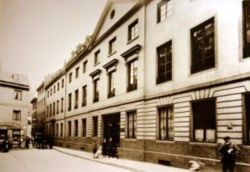Schott Music
 |
|
| Founded | 1770 |
|---|---|
| Founder | Bernhard Schott |
| Country of origin | Germany |
| Headquarters location | Mainz |
| Publication types | sheet music, albums, magazines |
| Imprints | Panton, Ars-Viva, Ernst Eulenburg, Fürstner, Cranz, Atlantis Musikbuch, Hohner-Verlag |
| Official website | www |
Schott Music (German: [ʃɔt]) is one of the oldest German music publishers. It is also one of the largest music publishing houses in Europe, and is currently the second oldest music publishing house. The company headquarters of Schott Music was founded by Bernhard Schott (10 August 1748 - 26 April 1809) in Mainz, Germany in 1770.
Schott Music is one of the world’s leading music publishers. It represents many of the greatest composers of the 20th and 21st centuries, and its publishing catalogue contains some 31,000 titles on sale and over 10,000 titles on hire. The repertoire ranges from complete editions, stage and concert works to general educational literature, fine sheet music editions and multimedia products. In addition to the publishing houses of Panton, Ars-Viva, Ernst Eulenburg, Fürstner, Cranz, Atlantis Musikbuch and Hohner-Verlag, the Schott group also includes two recording labels, Wergo (for new music) and Intuition (for Jazz), as well as eight specialist magazines.
The Schott Music group also includes the printing and production services company WEGA, as well as mds (music distributors services GmbH), the largest music product distribution organisation in Europe providing the distribution of sheet music, books, magazines, audio and audio-visual recordings, and hire materials of both the Schott catalogues and the catalogues of 60 other music publishers.
Representing composers and authors from all over the world, Schott Music has offices in ten countries with some 270 employees principally in Mainz, London, New York and Tokyo, with additional offices in Beijing, Madrid, Paris and Toronto.
The Schott publishing house was founded by Bernhard Schott (1748–1809) in Mainz in 1770, the year of Beethoven’s birth. The building, dated and now under a preservation order, is still the company’s head office. At the time of the foundation of the publishing house, Mainz boasted a flourishing cultural life and a busy court chapel. In 1780, Bernhard Schott was awarded the ’privilegium exclusivum’ together with the title of ’Court music engraver’. This meant that within the boundaries of the electorate of Mainz no third party was allowed to re-engrave or sell the works produced by him. Schott was one of the first publishers to use the printing technique of lithography, which meant that his editions were soon being printed and distributed on a wide scale.
...
Wikipedia
